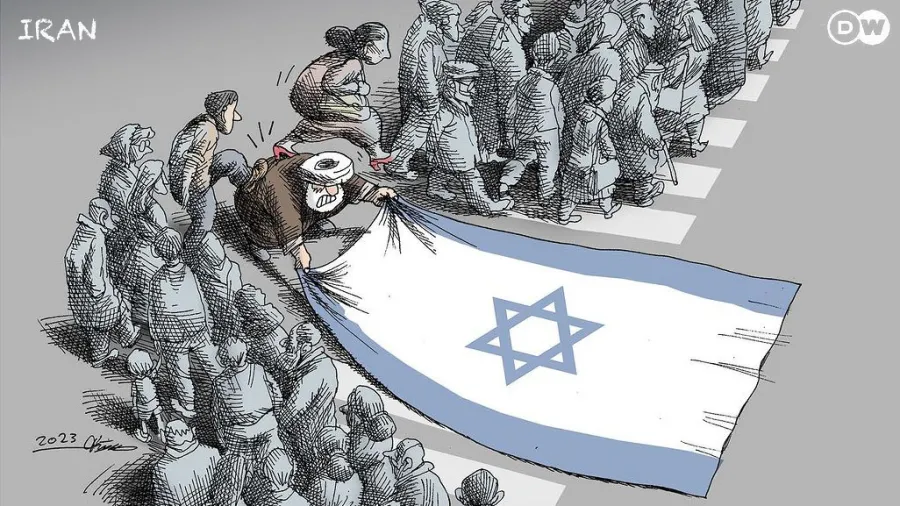Political leaders make policy based on their perceptions, not those of others. Americans/Westerners tend to believe that people who speak good English think like Americans. They don’t. Even worse, some of the West’s worst enemies speak superb English; they use this skill against us. We ignore this fact at our peril.
Javad Zarif, Iran’s then-foreign minister, bamboozled then-President Obama and Secretary of State Kerry into submitting to Iran’s demands in what began the Joint Comprehensive Plan of Action (JCPOA) —which was, in essence, American submission to Iran’s will. Zarif bragged about this in his tell-all book in Persian.
We cannot understand the attack on Iran’s senior IRGC leaders in Damascus on April 1, 2024, which many attribute to Israel, and the subsequent Iranian attack on Israel without taking the above into account.
Iranians constantly worry about a “Grand Conspiracy” (in Persian Tote-e-ye Bozorg) against them and their country. The events of the past few weeks fit perfectly into this mindset.
The Iranians ask: How did Israel know precisely when and where to eliminate Iran’s senior IRGC leadership in Syria and Lebanon?
Iranians reason: it was their erstwhile Alawite allies in Syria who run the country, i.e., President Assad.
How does Iran know this? Because the Alawites, though an offshoot of Shiism, aren’t truly allies because, while they both share the belief in the centrality of Muhammad’s cousin Ali as the central figure of their respective religions, Alawites see Ali as a god, which is anathema to Shiism. So, in the end, no matter how close they are as allies against the Sunnis, the Shiites have long suspected them as unreliable.
The Iranians reason: Assad’s people knew which Iranians were there. And Assad has been somewhat “unreliable” lately. How did Israel “get to them? Did Assad change sides?”
The Alawite-Jewish-Sunni Plot
In the 1930s and early ‘40s, Alawite leaders often saw the Jews in Palestine as an ally against the Sunnis, who then ruled Syria and were the largest group in British Palestine. Assad’s great-grandfather was one of seven Alawite leaders who signed a letter to the French rulers of Syria asking them to set up an independent Alawite State in Syria. In the letter,1 they cite the way the Sunnis were treating the Jews in Palestine as the way the Sunnis treated the Alawites in Syria. One of those Alawite leaders who signed this was the great-grandfather of Bashar Assad, the present leader of Syria.
(See below: The actual documents where the Alawites compare their situation to the Jews under Sunni/Muslim rule.)


So now, “behind the curtain (posht-e pardeh),” as they say in Persian, this supposedly “proves” the Alawite-Jewish/Israel connection.
How Did Iran’s Missile Attack on Israel Fail so Miserably?
Let’s continue the reasoning: How did? That is a miracle, even by scientific standards! Does this mean that Allah is against them? If so, what is Iran doing wrong? We have heard multiple answers to this question.
One more interesting suggestion from Iranians is that the leadership feels pushed into the corner. This fact plays into the hands of one of the ruling factions in Iran, which believes that if they provoke a conflagration with the Jews, then their Mahdi (Messiah) would come down and save them. The late Professor Bernard Lewis used to say, for them, a conflagration was an incentive, not a deterrent.
Others within the Iran regime fear an Israeli attack and do NOT want to go for broke.
Read the Writing on the Wall
But what concerned the Iranian regime even more was that Israel’s fantastic success deeply humiliated the Iranian government.
After Israel’s strike, graffiti began appearing on the streets in Iran. Though we don’t know how widespread it was, we know that the Iranian people were emboldened because they scribbled on walls asking Israel to continue striking. “You (i.e., Israel) go after the regime, and we will go out into the streets (and do the rest.)”

To complicate matters further, we have been hearing from many people in the Arab world and Iranians that there are now two opposing alliances in the Middle East:
- the American administration and their ally – the Iranian government.
- the Arab Sunni regimes (minus Qatar) and Israel.
Why do more and more Middle Easterners believe this? Because the American administration is putting massive pressure on the Israelis NOT to attack Iran’s allies – i.e., not to go into Rafah in the Gaza Strip and destroy Iran’s Hamas ally, not to go after Hizbullah, the Iranian’s fifth column in Lebanon, and, of course, not to attack Iran.
Absurd Conclusions
From the Iranian perspective, this “proves” that their view of the American-Iran alliance vs. Israel makes perfect sense.
From both an Iranian and Sunni Arab perspective, the American administration has shown that it is doing everything it can to strengthen the Iranian regime at the expense of America’s supposed ally Israel, America’s supposed Arab Sunni Allies, and finally, against the Iranian people.
Absurd? Certainly, from a Western point of view!
But it makes perfect sense to Middle Easterners.









